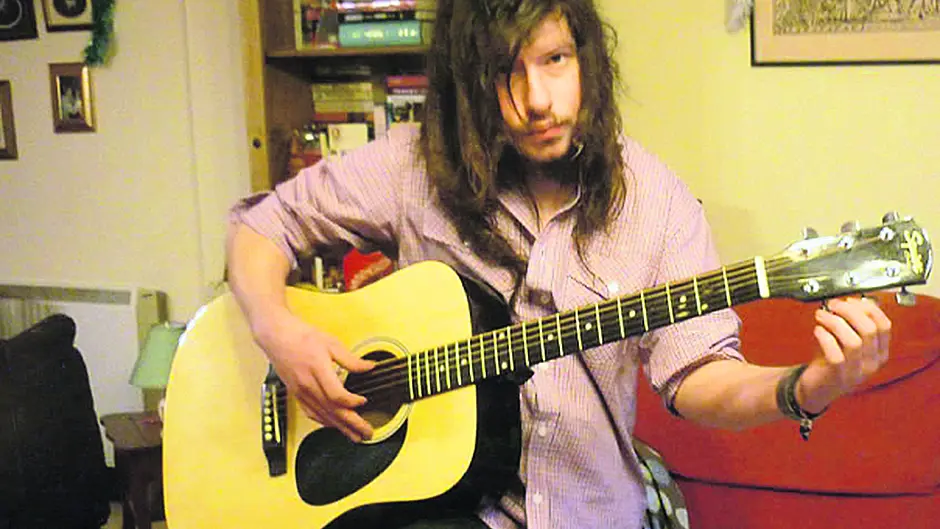Raised in Clonakilty, Conor O’Hagan was just 25 when he died in Tullamore. He hated being called homeless, because he loved sleeping beneath the stars, so he could ‘follow the sky’, his father recently told Justin Kelly
Raised in Clonakilty, Conor O’Hagan was just 25 when he died in Tullamore. He hated being called homeless, because he loved sleeping beneath the stars, so he could ‘follow the sky’, his father recently told Justin Kelly
BROUGHT up in Clonakilty, Conor O’Hagan was a regular on the streets of Tullamore in Co Offaly during the last few months of his life, and the talented musician often busked in the town centre and at open-mic nights. He passed away two weeks ago.
His father, however, said Conor ‘hated being called homeless.’
‘Conor was not a typical homeless person, if there is such a thing. There was far more to it than that. He was a travelling man,’ Kieran O’Hagan said.
Mr O’Hagan also cast doubt on the adequacy of services that would have been required to deal with his son’s situation. ‘As a family, we all agree that homelessness is a scourge, as is the lack of resources for mental health, education, hospitals, etc. We live in a very wealthy country, in a very wealthy world. However, until the model changes, or is changed, and we move to a society that cares primarily for its people, and is based on human decency and kindness, then I suspect there will be many more people who die on our streets or take their own lives.’
He went further, adding: ‘And maybe, if we lived in that world, back when Conor came to Ireland, and all of the supports were in place from day one, and he was not made to feel different to others, then maybe the outcome would have been better.’
Conor spent much of his youth growing up with his family in Cork during a typical family upbringing, and indeed, the photograph accompanying this article is Conor O’Hagan playing with his twin brother, Owen, in their bedroom at home in West Cork in the 1990s.
Owen was born first, but Conor was a difficult birth and didn’t arrive for two more hours. ‘Within a few more hours, it was clear something was not right and very soon after, Conor was diagnosed with what was then called DiGeorge Syndrome, a very complex genetic condition. This would be a significant factor during the rest of Conor’s short and more latterly, turbulent life,’ his father explained.
‘It is fair to say that his early years were very tough for him,’ his father said. ‘Despite all of that, though, he was a happy little boy and there is no doubt there was a charm there and everybody just wanted to cuddle him,’ Mr O’Hagan continued.
‘In 1996, when Louise, the boys’ sister, was seven and the boys were five, we decided that we would move to Ireland from the UK and bring them up in the beautiful countryside of West Cork. We moved from a terraced house, with a small back yard, to a four-bedroomed bungalow, with an acre of land, a huge playground for three young children,’ Kieran pointed out.
‘He still had regular hospital appointments, speech therapy, the odd minor operation, but he played just like his brother and sister and had as many friends and whilst his homework always took him longer, with a fair bit more input from his mum and dad, he appeared to be holding his own. Those were happy times for them – a new adventure, new school, new friends.’
The boys were just the best of mates, thick as thieves, with a sister to tease and torment to boot! ‘Conor had developed a really cheeky sense of humour and it was difficult to ever be cross with him for long if he had been bold. There are so many photos albums from those times that clearly show a very happy, playful and normal boy,’ Kieran recalled fondly.
Conor’s new school soon pointed out that the young boy was falling behind his peers, and a meeting to discuss extra tuition was set up. Although full-time support was recommended, Conor received five hours one-on-one tuition per week, his father said. ‘Unfortunately, by this point, Conor had become aware that he was struggling in lessons, he had formed friendships in classes he did not want to leave, he was more grown up and independent, and most of all, he did not want to be treated differently to his peers.’
From Transition Year on, he spent less and less time with his family and his friendships began to dwindle. ‘He became almost obsessive about heavy metal music and stayed in his room as much as possible. He started to care less about himself and his personal hygiene. All of these things could be seen as ‘typical teenage’ behaviour, but with Conor having DiGeorge, where there is a higher prevalence of mental health issues amongst adolescents and young adults, there was perhaps more to it.’
Things came to a head late in his fifth year at school when Conor had a mental breakdown, according to his father. ‘We decided to take him out of school and through the HSE, we set up regular appointments with a psychiatrist and psychologist. The consensus there was that Conor was certainly different but that he showed no signs of serious mental health problems. I must admit, we found that hard to comprehend.’
His father says that when Conor turned 18, he refused therapy and he left home, ‘though we still remained close and in constant contact,’ Kieran said. ‘We were able to set him up for disability allowance (due to DiGeorge) and rent allowance and he rented a room in Cork City. He began to drink heavily and soon it was rare to see him or talk to him when he was not very drunk. His life descended into chaos and it was not possible to get him to see where it was heading.’
In the following two to three years, he was evicted from one bedsit after another, before deciding that he did not need a home. ‘Not long after making himself homeless, the Occupy Cork protest commenced and Conor spent many nights with the people there and undoubtedly enjoyed the camaraderie and friendships he made. After that campaign ended, whilst he really missed the kinship, several people who also lived ‘alternative’ lifestyles stayed in touch.
His father admits that when he saw Conor at Christmas 2014, he ‘was shocked at how much he had deteriorated’ then, but Conor was adamant he was going to continue his life as a travelling man.
‘Conor also spent time in Wexford where he was picked up under the Mental Health Act. When he was “let out” in April 2015, he took a bus to Dublin and a boat to England.
‘After arriving in England, Con met up several times with his mother, brother and sister, who had all now moved back to Manchester. He then decided to travel down to London and then on to France, Belgium the Netherlands, and finally Germany. We still spoke on a regular basis, though he was nearly always incoherent,’ Kieran recalled.
On Holy Thursday 2016, Kieran received a phone call from a hospital in Bochum (near Dortmund) in Germany. Conor had been in ICU for two weeks with heart problems and pneumonia. ‘I travelled to Germany the next morning and was horrified to see him in such a poor state of health. I was told by the doctors that he was lucky to be alive and that he needed to spend several weeks in hospital and needed MRI scans to assess the full damage.’
After a couple of weeks, Kieran was able to bring him back to Cork, where he was admitted to the Coronary Care Unit in the Mercy Hospital. ‘All of the relevant scans were done and the news was not good. He was in heart failure. He was told, in no uncertain terms, that he would be dead within a year if he did not change his lifestyle,’ his heartbroken father said.
Knowing that Conor needed a huge incentive to stay in Cork and to change his lifestyle, his uncle Geoff stepped in. ‘The only rules that were laid down were: medication every day, regular showers and no drink. If Conor followed them and put his songs to paper, he would be recorded. Things went well for a few weeks but he then started to become restless.’
Within two weeks, he was back in hospital again, though this time with very severe psychotic episodes, believing he was being attacked by various people from his travels. ‘He was once again detained under the Mental Health Act, only to refuse to co-operate again. Every day I had heartbreaking conversations with Conor. Every day his answer was the same. He wanted to be free. He wanted to have his whiskey and live under the stars, to ‘follow the sky’, which as anyone who knows Conor also knows, was his mantra and one of the lyrics in many of his songs.’
Kieran says the last few heartbreaking months and days of his son’s life saw him eventually find ‘his spiritual home’ in Tullamore.
He spent his last couple of months there, met some obviously very decent people, and was shown amazing kindness.
And, once more, Kieran got a call to say he was in hospital. ‘When I arrived at the hospital the following morning, I knew he was living on borrowed time. Again I had the same conversation. He had to change. He said to me, “Dad, go and see where I live, I wake up every morning and see the sky. I have my guitar, I have my whiskey, why would I want to change that?” Conor was a free spirit, he lived life the way he wanted to live it.’
Sadly, that was Kieran’s last real conversation with Conor. Soon after, he was sedated and placed on a ventilator. On February 20th at 12.30am, Conor died peacefully in the ICU at Tullamore Hospital, after two weeks on a life support machine. His family were with him and his guitar lay by his side.
‘He came across some very kind people during his travels in Ireland and Europe, but as a family we were all extremely touched by the enormous kindness shown to him by the people in Tullamore,’ said Kieran, adding: ‘He was unique. He was our beautiful son, brother, nephew and cousin.’
• If you have been affected by this story and wish to donate to relevant charities in Conor’s memory, those preferred by Conor’s family are the DiGeorge charity 22q11, and Cork Simon Community (021 4321 051).
Thanks to the Offaly Express for kind permission to reprint this article. Read the article in full at offalyexpress.ie.









